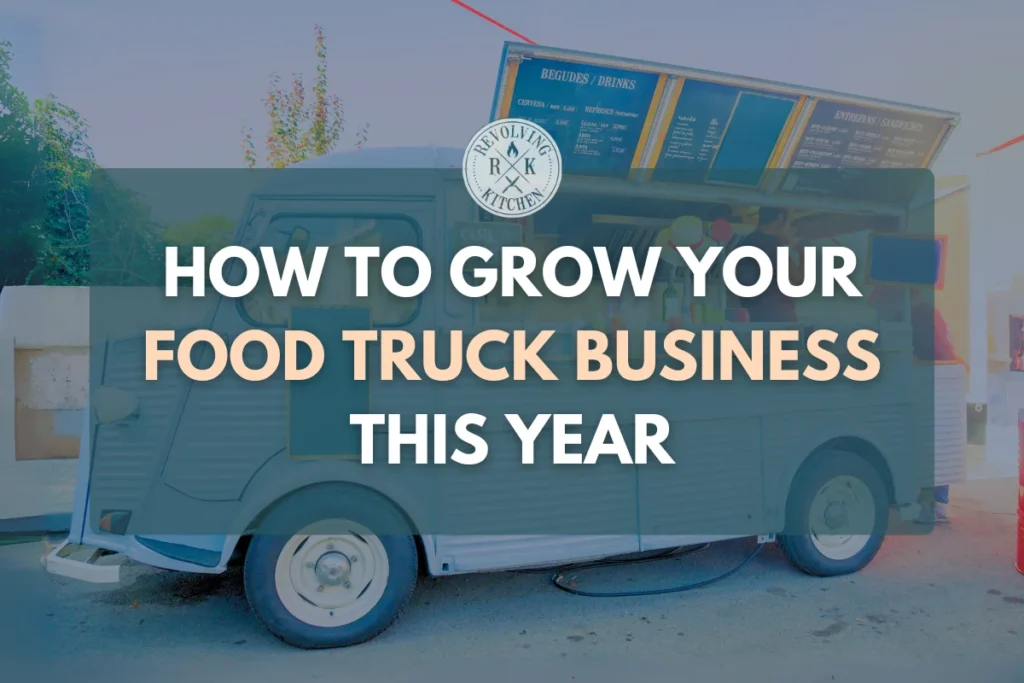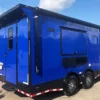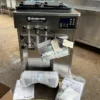
Essential Equipment Checklist for Your Food Trailer Business
Essential Equipment Checklist for Your Food Trailer Business Starting a food trailer business requires careful planning and the right equipment to ensure success. This comprehensive guide covers all essential equipment categories from cooking appliances to safety systems.
Cooking Equipment Fundamentals
The heart of any successful food trailer lies in its cooking equipment. Your choice of appliances will directly impact your menu capabilities, cooking efficiency, and overall profitability.
Commercial-grade grills serve as the backbone for many food trailer operations. Flat-top grills offer versatility for burgers, sandwiches, and breakfast items, while char-broilers provide that distinctive grilled flavor customers crave. Consider propane-powered units for consistent heat control and mobility.
Deep fryers are essential for operations serving fried foods. Commercial countertop fryers work well in space-constrained trailers, while larger floor models suit high-volume operations. Look for units with built-in filtration systems to maintain oil quality and reduce replacement costs.
Convection ovens maximize your cooking versatility in limited space. These units cook faster and more evenly than conventional ovens, making them perfect for baking, roasting, and reheating. Combination units that include steaming capabilities offer even greater menu flexibility.
Refrigeration and Food Storage Systems
Proper refrigeration prevents food spoilage and ensures compliance with health department regulations. Your refrigeration needs depend on your menu complexity and daily volume expectations.
Reach-in refrigerators provide easy access to frequently used ingredients. Two-door units offer good capacity while fitting most trailer layouts. Consider units with glass doors for quick inventory checks without opening the unit. Essential Equipment Checklist for Your Food Trailer Business
Under-counter refrigeration maximizes space efficiency. These units fit beneath prep counters, keeping ingredients within arm’s reach while maintaining proper temperatures. Drawer-style units offer excellent organization for different ingredient categories.
Freezer space is crucial for storing proteins, frozen ingredients, and backup inventory. Chest freezers offer maximum storage capacity, while upright units provide better organization and easier access to items.
Dry storage solutions keep non-perishable ingredients organized and easily accessible. Stainless steel shelving units resist moisture and clean easily. Consider adjustable shelving to accommodate different package sizes and seasonal inventory changes.
Food Preparation Equipment
Efficient food preparation equipment speeds service and maintains consistency across your menu items.
Commercial food processors handle chopping, slicing, and dicing tasks quickly and uniformly. Variable speed controls accommodate different ingredients, from delicate herbs to tough vegetables. Look for units with multiple blade attachments for maximum versatility.
Prep tables with built-in refrigeration keep ingredients at safe temperatures during busy service periods. Sandwich prep tables work well for sub shops and burger operations, while pizza prep tables suit operations serving Italian cuisine.
Commercial mixers handle everything from salad dressings to bread dough. Stand mixers with multiple attachments can knead, whip, and mix various ingredients. Consider units with bowl guards for safety compliance.
Slicers ensure consistent portion control for meats and cheeses. Manual slicers work well for lower-volume operations, while automatic units speed service during peak periods. Always prioritize safety features like blade guards and non-slip bases.
Power Generation and Electrical Systems
Reliable power generation keeps your operation running smoothly regardless of location availability.
Generators provide independence from external power sources. Calculate your total electrical load including all appliances, lighting, and ventilation systems. Choose a generator with 25% more capacity than your calculated needs to handle startup surges and future equipment additions.
Propane systems power many food trailer appliances efficiently. Install proper regulators, shut-off valves, and leak detection systems. Consider dual-tank setups to prevent service interruptions during tank changes.
Electrical panels distribute power safely throughout your trailer. Install GFCI outlets in all wet areas and ensure proper grounding for all equipment. Consider hiring a licensed electrician for installation to ensure code compliance.
Water Systems and Plumbing
Adequate water systems support food preparation, cleaning, and hand washing requirements mandated by health departments.
Fresh water tanks store clean water for cooking and cleaning. Size your tank based on daily usage patterns and refill opportunities. Consider 40-50 gallons minimum for most operations, with larger tanks for remote locations.
Water heaters provide hot water for cleaning and sanitizing. Tankless units save space while providing on-demand hot water. Ensure adequate BTU capacity to meet peak demand periods.
Three-compartment sinks handle dish washing and sanitizing requirements. Size compartments to accommodate your largest pots and pans. Include adequate counter space on both sides for dirty and clean dish staging.
Hand washing stations must meet health department specifications. Install hands-free faucets where possible to improve sanitation. Provide soap dispensers, paper towels, and waste receptacles at each station.
Ventilation and Fire Safety
Proper ventilation removes heat, smoke, and grease while maintaining comfortable working conditions and meeting safety codes.
Exhaust hoods capture cooking vapors and grease particles. Size hoods to extend beyond cooking equipment edges. Install variable speed fans to adjust ventilation based on cooking intensity.
Fire suppression systems protect your investment and ensure safety compliance. Automatic systems activate when temperatures exceed safe limits, while manual controls allow immediate activation when needed.
Fire extinguishers provide first-line defense against small fires. Install Class K extinguishers for cooking fires and Class ABC units for general use. Train all staff on proper extinguisher use and maintenance schedules.
Smoke detectors and carbon monoxide detectors provide early warning of dangerous conditions. Install battery-powered units with loud alarms audible over kitchen noise. Test regularly and replace batteries according to manufacturer recommendations.
Point of Sale and Technology
Modern POS systems streamline ordering, payment processing, and inventory management while providing valuable business analytics.
Tablet-based POS systems offer mobility and ease of use. Cloud-based systems sync data across multiple devices and locations. Look for systems with offline capabilities to handle temporary internet outages.
Payment processing equipment accepts various payment methods including credit cards, mobile payments, and contactless transactions. Choose processors with competitive rates and fast settlement times.
Internet connectivity enables POS functionality and social media marketing. Consider cellular hotspots for reliable internet access at any location. Backup connectivity options prevent service disruptions during peak periods.
Cleaning and Sanitation Equipment
Maintaining cleanliness protects customer health and ensures regulatory compliance while preserving your business reputation.
Pressure washers clean exterior surfaces and heavy-duty equipment quickly and effectively. Electric units work well for regular cleaning, while gas-powered units handle tough jobs and remote locations without electrical access.
Sanitizing solutions kill bacteria and viruses on food contact surfaces. Stock EPA-approved sanitizers appropriate for food service use. Consider automatic dispensing systems for consistent concentration and reduced waste.
Cleaning supplies including degreasers, detergents, and disinfectants keep your trailer spotless. Choose commercial-grade products designed for food service applications. Organize supplies in clearly labeled containers away from food storage areas.
Safety and Security Systems
Protecting your equipment investment and ensuring staff safety requires comprehensive security and safety measures.
Security cameras deter theft and provide evidence if incidents occur. Wireless systems offer easy installation and remote monitoring capabilities. Position cameras to cover entry points, cash handling areas, and equipment storage.
Alarm systems alert you to unauthorized access attempts. Motion sensors, door contacts, and glass break detectors provide comprehensive coverage. Consider systems with smartphone notifications for immediate alerts.
First aid supplies treat minor injuries and comply with workplace safety requirements. Stock bandages, antiseptic, burn gel, and other basic medical supplies. Train staff on basic first aid procedures and emergency response protocols.
Maintenance and Spare Parts
Regular maintenance prevents costly breakdowns and extends equipment life while ensuring consistent food quality and service.
Basic tools enable routine maintenance and minor repairs. Stock screwdrivers, wrenches, multimeters, and other common tools. Include equipment-specific tools recommended by manufacturers.
Spare parts for critical equipment prevent extended downtime. Keep common failure items like fuses, gaskets, and filters in stock. Establish relationships with local suppliers for quick access to additional parts.
Maintenance schedules ensure regular equipment care. Create checklists for daily, weekly, and monthly maintenance tasks. Document all maintenance activities for warranty compliance and troubleshooting reference.
Budget Planning and Equipment Sourcing
Smart equipment purchasing balances initial costs with long-term reliability and operational efficiency.
New equipment offers warranties and latest features but requires higher initial investment. Commercial equipment dealers provide expert advice and ongoing support. Consider financing options to preserve working capital.
Used equipment reduces startup costs but may require more maintenance. Inspect used equipment thoroughly and verify remaining warranty coverage. Factor potential repair costs into your purchasing decision.
Leasing options preserve capital while providing access to quality equipment. Compare lease terms carefully and understand end-of-lease options. Some leases include maintenance coverage, reducing unexpected repair costs.
Equipment financing spreads costs over time while building business credit. Compare rates and terms from multiple lenders. Consider seasonal payment schedules that align with your business cash flow patterns.
The Small Business Administration offers various loan programs that can help finance equipment purchases for qualifying food service businesses.
Professional equipment consultants help optimize your equipment selection based on your specific menu and operational requirements. Their expertise can prevent costly mistakes and ensure efficient trailer layout design.
Success in the food trailer business depends heavily on choosing the right equipment combination for your specific concept and market. Prioritize quality, reliability, and efficiency over lowest initial cost. Remember that well-maintained commercial equipment provides years of reliable service while supporting your business growth and profitability goals.
Regular equipment evaluation helps identify upgrade opportunities and replacement needs before failures occur. Stay informed about new technologies and efficiency improvements that could benefit your operation. The National Restaurant Association provides valuable resources and industry updates for food service operators.


